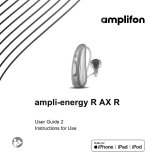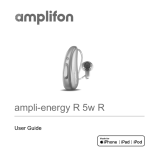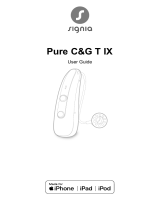Page is loading ...

ITC/ITE Li 7
User Guide

2
Content
Welcome 4
Your hearing aids 5
Inrument type 5
Getting to know your hearing aids 6
Components and names 6
Controls 6
Hearing programs 8
Features 8
Daily use 9
Charging 9
Turning on and o hearing aids 11
Switching to andby mode 12
Inserting and removing the hearing aids 13
Adjuing the volume 14
Changing the hearing program 15
Further adjuments (optional) 15
Special liening situations 16
On the phone 16
Audio reaming with iPhone 17
Audio reaming with Android phone 17
Airplane mode for hearing aids 17

3
Maintenance and care 19
Cleaning 19
Drying 20
Storage 20
Professional maintenance 21
Important safety information 22
Safety information on power cells 22
Further information 24
Accessories 24
Operating, transport and orage conditions 24
Explanation of symbols 26
Troubleshooting 28
Country-specic information 30
Service and warranty 31

4
Welcome
Thank you for choosing our hearing aids to accompany
you through everyday life. Like anything new, it may take
you a little time to become familiar with them.
This guide, along with support from your Hearing Care
Professional, will help you underand the advantages
and greater quality of life your hearing aids oer.
To receive the mo benet from your hearing aids, it is
recommended that you wear them every day, all day.
This will help you get adjued to them.
The device may not look exactly like the guiding
illurations in these inructions. We reserve the
right to make any changes we consider necessary.
CAUTION
It is important to read this user guide and the safety
manual thoroughly and completely. Follow the
safety information to avoid damage or injury.
Before using your hearing aids for the r time,
fully charge them.

5
Your hearing aids
This user guide describes optional features that
your hearing aids may or may not have.
Ask your Hearing Care Professional to indicate the
features that are valid for your hearing aids.
Inrument type
Your hearing aids are worn in the outer ear. The
inruments are not intended for children under the age
of 3 years or persons with a developmental age of under
3 years.
A power cell (lithium-ion rechargeable battery) is
permanently built into your hearing aid. This enables
easy charging with your charger.
The wireless functionality enables advanced audiological
features and synchronization between your two hearing
aids.
Your hearing aids feature Bluetooth® Low Energy*
technology allowing for easy data exchange with your
smartphone, and for seamless audio reaming with your
iPhone**.
* The Bluetooth word mark and logos are owned by the Bluetooth SIG, Inc., and any
use of such marks by WS Audiology Denmark A/S is under license. Other trademarks
and trade names are those of their respective owners.
** iPad, iPhone, and iPod touch are trademarks of Apple Inc., regiered in the U.S.
and other countries.

6
Getting to know your hearing aids
Please download the Audio Service App for remote
control features.
You can also ask your Hearing Care Professional about
another remote control option.
Components and names
➊Push button
➋Microphone opening
➌Vent
Controls
With the push button you can, for example, switch
hearing programs. The Hearing Care Professional has
programmed your desired functions to the push button.
You can use the Audio Service App for remote
control.

7
Push button function L R
Press briefly:
Program up
Volume up
Volume down
Tinnitus therapy signal level up
Tinnitus therapy signal level down
TV ream on/o
Press for about 2 seconds:
Program up
Volume up
Volume down
Tinnitus therapy signal level up
Tinnitus therapy signal level down
TV ream on/o
Press for more than 3 seconds:
Standby/turn on
L = Left, R = Right

8
Hearing programs
1
2
3
4
5
6
Read more in section "Changing the hearing program".
Features
The tinnitus therapy feature generates a sound to
diract you from your tinnitus.

9
Daily use
Charging
Use Cuom Charger Station to charge your hearing aids.
Place your hearing aids in the charger as shown.

10
Hearing aids may get hot during charging
Due to the nature of charging technology, low level
of heat is emitted, which increases the temperature
of the charger and devices. The devices can get
very warm and may even be perceived as hot.
This is normal and does not aect the quality of
charging. It also happens to almo all electronic
devices that are being charged, especially those
using inductive charging technology (e.g. Qi).
To many people, any temperature above body
temperature can feel hot to touch. Hence, some
people may have the impression that the charger
or hearing aid is overheating, even when it is ju
above body temperature. This is, however, merely
a subjective feeling, and it does not in any way
entail that the hearing aid is overheating or that
anything is wrong.
If you feel that your hearing aids are too hot to
the touch, please insert them only after they have
cooled down and until you feel comfortable with the
temperature of the devices.
In general, if you wish to decrease the temperature
of the hearing aids, you may do the following:
XKeep the lid open when charging.
XMove the charger away from any heat sources /
direct sunlight.
XPlace the charger in an environment with lower
ambient temperature.

11
Turning on and off hearing aids
You have the following options to turn your hearing aids
on or o.
XTurning on:
Take the inruments out of the charger.
The artup melody is played in your hearing aids. The
default volume and hearing program are set.
XTurning o in charger:
Place the hearing aids in the charger.
Make sure the charger is on
XIf the charger is turned o and you insert
hearing aids that are turned on, these are
not automatically turned o and will not be
recharged.
XIf the charger is on and you insert hearing aids
that are turned on, these are automatically
turned o and recharged.
XTurning o on push
button:
Use the push button on
the hearing aid.
Simply press and hold
for 10 seconds.

12
Switching to andby mode
Via remote control, you can switch your hearing aids to
andby mode. This mutes the hearing aids. When you
leave andby mode, the previously used volume and
hearing program are set.
XIn andby mode, the hearing aids are not
turned o completely. They draw some power.
Therefore we recommend to use andby mode
only for a short period of time.
XIf you want to leave the andby mode but the
remote control is not at hand:
Turn your hearing aids o and on again by
shortly placing them in the charger until one or
more LEDs light up.
To do this, the charger mu be powered. Wait
until the hearing aids play the artup melody.
This may take several seconds. Note that the
default volume and hearing program are set.

13
Inserting and removing the hearing aids
Your hearing aids have been ne-tuned for your right and
left ear. The labeling on the hearing aids indicates the
side:
● "R" = right ear
● "L" = left ear
Inserting a hearing aid:
XCarefully push the hearing
aid into the ear canal.
XTwi it slightly until it sits
well.
Open and close
your mouth to avoid
accumulation of air in the
ear canal.
Removing a hearing aid:
XPush lightly on the back of your ear to loosen the
hearing aid.

14
XGrip the hearing aid in the
ear canal with two ngers
and pull it carefully out.
Clean and dry your hearing aids after usage. Read more
in section "Maintenance and care".
Adjuing the volume
Your hearing aids automatically adju the volume to the
liening situation.
XIf you prefer manual volume adjument, use a remote
control option.
An optional signal can indicate the volume change.

15
Changing the hearing program
Depending on the liening situation, your hearing aids
automatically adju their sound.
Your hearing aids may also have several hearing
programs which allow you to change the sound, if
needed. An optional signal tone can indicate the program
change.
XTo change the hearing program manually, use a
remote control option.
Refer to section "Hearing programs" for a li of your
hearing programs.
The default volume is applied.
Further adjuments (optional)
You can also use the hearing aid controls to change
other features, for example, the level of the tinnitus
therapy signal.
Refer to section "Controls" for the setting of your controls.

16
Special liening situations
On the phone
When you are on the phone, turn the
receiver slightly so that it does not
completely cover your ear.
Telephone program
You may prefer a certain volume when using the phone.
Ask your Hearing Care Professional to congure a
telephone program.
XSwitch to the telephone program whenever you are on
the phone.
If a telephone program is congured for your hearing
aids, it is lied in section "Hearing programs".

17
Audio reaming with iPhone
Your hearing aids are Made for iPhone hearing aids.
This means you can get phone calls and lien to music
from your iPhone directly into your hearing aids.
For more information about compatible iOS devices,
pairing, audio reaming and other useful functions,
contact your Hearing Care Professional.
Audio reaming with Android phone
If your mobile phone supports Audio Streaming for
Hearing Aids (ASHA), you can get phone calls and
lien to music from your mobile phone directly into your
hearing aids.
For more information about compatible Android devices,
pairing, audio reaming and other useful functions,
contact your Hearing Care Professional.
Airplane mode for hearing aids
Airplane mode is when Bluetooth® of your hearing
aids is turned o. In areas where the use of Bluetooth
technology is not allowed (e.g. on some airplanes), you
can deactivate Bluetooth mode. This turns Bluetooth in
your hearing aids o temporarily. The hearing aids ill
work without Bluetooth, however direct audio reaming
will not be possible and other functions will not be
available.
XTo deactivate or activate the Bluetooth mode, use the
smartphone app.

18
An alert tone indicates when Bluetooth mode is
deactivated or activated.

19
Maintenance and care
To prevent damage it is important that you take care of
your hearing aids and follow a few basic rules, which will
soon become a part of your daily routine.
Cleaning
For hygiene reasons and to maintain functionality, clean
your hearing aids daily.
XClean your hearing aids daily with a soft, dry tissue.
XYour hearing aids may
have a wax protection. This
prevents the ingress of
earwax. Be careful not to
damage the wax protection
when cleaning your hearing
aids.
XNever use running water or immerse the
devices in water.
XNever apply pressure while cleaning.
XAsk your Hearing Care Professional for recommended
cleaning products, special care sets, or more
information on how to keep your hearing aids in good
condition.

20
Drying
XDry your hearing aids overnight.
XAsk your Hearing Care Professional for more
information.
Storage
Short-term orage (up to several days):
XTurn o your hearing aids by placing them in the
charger.
The charger mu be on. If the charger is not on and
you place your hearing aids in the charger, the hearing
aids are not turned o.
XNote that when you turn o the hearing aids via
a remote control or smartphone app, the hearing
aids are not turned o completely. They are in
andby-mode and ill draw some power.
Long-term orage (weeks, months, ...):
XFully charge your hearing aids; then disconnect the
charger from power, manually turn o the hearing aids,
and place them in the charger with the lid closed.
XWe recommend using drying products while oring
the hearing aids.
XFor longer periods of non-use, ore your hearing aids
in a dry environment.
XObserve the orage conditions in section "Operating,
transport and orage conditions".
/













